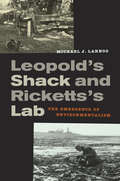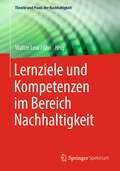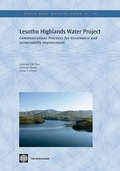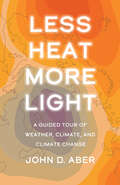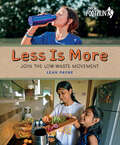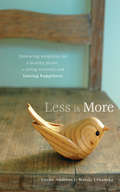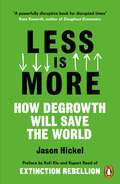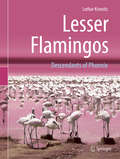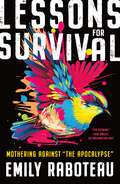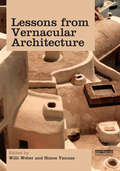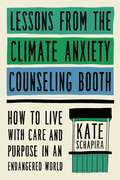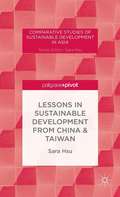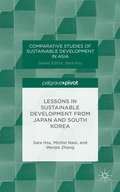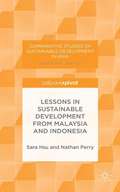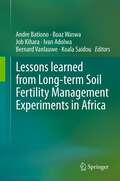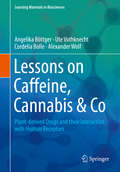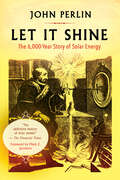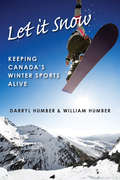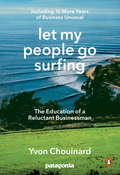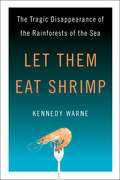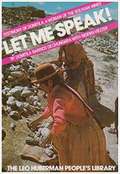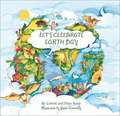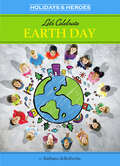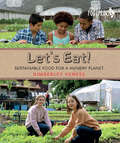- Table View
- List View
Leopold’s Shack and Ricketts’s Lab: The Emergence of Environmentalism
by Michael LannooAldo Leopold and Ed Ricketts are giants in the history of environmental awareness. They were born ten years and only about 200 miles apart and died within weeks of each other in 1948. Yet they never met and they didn't read each other's work. This illuminating book reveals the full extent of their profound and parallel influence both on science and our perception of natural world today. In a lively comparison, Michael J. Lannoo shows how deeply these two ecological luminaries influenced the emergence both of environmentalism and conservation biology. In particular, he looks closely at how they each derived their ideas about the possible future of humanity based on their understanding of natural communities. Leopold and Ricketts both believed that humans cannot place themselves above earth's ecosystems and continue to survive. In light of climate change, invasive species, and collapsing ecosystems, their most important shared idea emerges as a powerful key to the future.
Lernziele und Kompetenzen im Bereich Nachhaltigkeit (Theorie und Praxis der Nachhaltigkeit)
by Walter Leal FilhoDas Buch zeigt Ihnen, wie sich Lernziele und Kompetenzen im Bereich Nachhaltigkeit ergänzen und hilft, die komplexe und vernetzte Natur der Nachhaltigkeit besser zu verstehen, und die damit verbundenen Herausforderungen zu erkennen und anzugehen. Dazu gehört auch die Vermittlung von Kenntnissen über die verschiedenen Aspekte der Nachhaltigkeit, wie z. B. ökologische, soziale und wirtschaftliche Aspekte, sowie deren Wechselwirkung miteinander. Darüber hinaus zeigt das Buch auf, wie Sie die möglichen Auswirkungen von Entscheidungen und Maßnahmen auf die Nachhaltigkeit einschätzen und bewerten können. Das Buch beschreibt die Zusammenhänge zwischen Nachhaltigkeit und Lernen. Es wird erörtert, wie Bildung und Lernen im Bereich der Nachhaltigkeit uns helfen können, die natürliche Welt und unsere Beziehung zu ihr zu verstehen und bessere Entscheidungen zu treffen, um unser Leben und die Umwelt zu verbessern. Es untersucht auch die Rolle von Technologie und Bildung im Bereich der Nachhaltigkeit und erkundet, wie Nachhaltigkeit in den Unterricht und das Lernen integriert werden kann. Schließlich enthält das Buch praktische Ratschläge zur Schaffung eines nachhaltigen Lernumfelds und zur Anwendung von Nachhaltigkeit in der Hochschulbildung und in den unteren Bildungsstufen.
Lesotho Highlands Water Project: Communication Practices for Governance and Sustainability Improvement
by Leonardo Mazzei Lawrence J. M. Haas Donal O'LearyThis paper considers the multi-faceted lessons of the Lesotho Highlands Water Project and how the project can serve as a model of mutually beneficial development, though demonstrating the benefits of a bilateral governmental cooperative approach in the development of an international river. These benefits include exceeding the impact of individual national approaches and strengthening political cooperation among all participants. This model is particularly relevant since approximately 40 percent of the world's population lives in transboundary river basins and more than 90 percent of the world's population lives within countries that share these basins.
Less Heat, More Light: A Guided Tour of Weather, Climate, and Climate Change
by John D. AberA straightforward and fact-based exploration of how weather happens, how it relates to climate, and how science answers major questions about Earth as a system Climate change is one of the most hotly contested environmental topics of our day. To answer criticisms and synthesize available information, scientists have been driven to devise increasingly complex models of the climate system. This book conveys that the basics of climate and climate change have been known for decades, and that relatively simple descriptions can capture the major features of the climate system and help the general public understand what controls climate and weather, and how both might be changing. Renowned environmental scientist and educator John D. Aber distills what he has learned from a long fascination with weather and climate, the process of science, and the telling of the story of science. This is not a book about policies and politics. Instead, it explores how weather happens, how it relates to climate, and how science has been used to answer major questions about the Earth as a system and inform policies that have reversed environmental degradation. By providing a guided tour of the science of weather, this thoughtful survey will contribute clarity and rationality to the public understanding of climate change.
Less Is More: Join the Low-Waste Movement (Orca Footprints #28)
by Leah PayneAll over the world, people are joining the low-waste movement and getting tough on their trash. Maybe you’ve heard the reports of the Great Pacific Garbage Patch swirling in the ocean. Maybe you’ve seen the photos of whales and sea birds with trash in their bellies. Or maybe you’ve heard that only 9 percent of our plastic waste actually gets recycled. We can all do our part for the planet by creating less garbage. In Less Is More young readers will discover how to avoid waste in the first place, reduce how much they use and reuse what they can, before they recycle and rot (compost) the rest. With small, simple actions we can become part of the circular economy. Find out how you can join the low-waste movement—and get your friends and family on board too!
Less is More
by Cecile Andrews Wanda Urbanska"it is a series of hard-hitting essays by a diverse collection of writers that wraps its arms around everything from simplicity to climate change to economic metrics to happiness. I approached each chapter (each new writer) with skepticism and a willingness to put the book down, and I found my self delighted time after time. This is a book anyone would be glad to have on their shlf." - Lyle Estill "Here is a book with its roots in the earth that can move you to new places, stimulate ideas and encourage change. Less is More will show you how to divest gradually, to live more in the present moment, while still paying attention to technology, health, politics and the environment. Simplicity is not a turning away. It is a rejoining." Barbara Bamberger Scott "The anthology's true strength comes in the diversity of its voices - which include not only journalists and activists, but also businesspeople and ministers. Less is More will serve as an informative and inspiring primer." - Ryan Williams, ForeWord Magazine "Andrews and Urbanska are masterful in their prose and their ability to bring together an eclectic array of writers, thinkers and sustainability adovcates who live in ways that echo what they write about. " John Ivanko "No good idea stays local for long," writes Jay Walljaspsr in Less is More, a smart collection of essays that chant the simplicity mantra without oversimpifying the issues at stake. Many of these ideas seem bound to travel far." - Utne Reader "I am both educated and inspired by the writings in Less is More. Living simply, like finding the heart, is the work of a lifetime. It is not easy to get there, but it provides a life of ease once the goal is reached. This book is a wonderful contribution to reorienting our lives away from the alienating influences of our shame-inducing consumer culture back toward what is really important: the choice to care for ourselves, others and the planet in a simple, loving way." - Glenn Berger, PhD, glennbergerblog People are afraid and anxious. We're destroying the planet, undermining happiness, and clinging to an unsustainable economy. Our obsessive pursuit of wealth isn't working. But there's another way. Less can be More. Throughout history wise people have argued that we need to live more simply--that only by limiting outer wealth can we have inner wealth. Less is More is a compelling collection of essays by people who have been writing about simplicity for decades. They bring us a new vision of Less: less stuff, less work, less stress, less debt. A life with Less becomes a life of More: more time, more satisfaction, more balance, and more security. When we have too much, we savor nothing. When we choose less, we regain our life and can think and feel deeply. Ultimately, a life of less connects us with one true source of happiness: being part of a caring community. Less is More shows how to turn individual change into a movement that leads to policy changes in government and corporate behavior, work hours, the wealth gap, and sustainability. It will appeal to those who want to take back their lives, their planet, and their well-being.
Less is More: How Degrowth Will Save the World
by Jason Hickel'A powerfully disruptive book for disrupted times ... If you're looking for transformative ideas, this book is for you.' KATE RAWORTH, economist and author of Doughnut EconomicsA Financial Times Book of the Year______________________________________Our planet is in trouble. But how can we reverse the current crisis and create a sustainable future? The answer is: DEGROWTH.Less is More is the wake-up call we need. By shining a light on ecological breakdown and the system that's causing it, Hickel shows how we can bring our economy back into balance with the living world and build a thriving society for all. This is our chance to change course, but we must act now.______________________________________'A masterpiece... Less is More covers centuries and continents, spans academic disciplines, and connects contemporary and ancient events in a way which cannot be put down until it's finished.' DANNY DORLING, Professor of Geography, University of Oxford'Jason is able to personalise the global and swarm the mind in the way that insects used to in abundance but soon shan't unless we are able to heed his beautifully rendered warning.' RUSSELL BRAND'Jason Hickel shows that recovering the commons and decolonizing nature, cultures, and humanity are necessary conditions for hope of a common future in our common home.' VANDANA SHIVA, author of Making Peace With the Earth'This is a book we have all been waiting for. Jason Hickel dispels ecomodernist fantasies of "green growth". Only degrowth can avoid climate breakdown. The facts are indisputable and they are in this book.' GIORGIS KALLIS, author of Degrowth'Capitalism has robbed us of our ability to even imagine something different; Less is More gives us the ability to not only dream of another world, but also the tools by which we can make that vision real.' ASAD REHMAN, director of War on Want'One of the most important books I have read ... does something extremely rare: it outlines a clear path to a sustainable future for all.' RAOUL MARTINEZ, author of Creating Freedom'Jason Hickel takes us on a profound journey through the last 500 years of capitalism and into the current crisis of ecological collapse. Less is More is required reading for anyone interested in what it means to live in the Anthropocene, and what we can do about it.' ALNOOR LADHA, co-founder of The Rules'Excellent analysis...This book explores not only the systemic flaws but the deeply cultural beliefs that need to be uprooted and replaced.' ADELE WALTON
Lesser Flamingos: Descendants Of Phoenix
by Lothar Krienitz<P><P>This book provides insights into the fascinating life of the Lesser Flamingo (Phoeniconaias minor) and describes how this enigmatic bird has adapted to the extreme conditions of tropical soda lakes and can even withstand the caustic effects of brine. However, humans are increasingly disrupting the natural cycles of these wetlands, and for these pink birds characteristic of these salt lakes, it is becoming more and more difficult to find suitable habitats, food and breeding grounds. Their fate is considered a cautionary example of man’s dealings with nature. Will the Lesser Flamingo survive in a man-made world? <P><P> Flamingos are considered to be an embodiment of the Phoenix, and the author interweaves his personal experiences with and observations of the flamingos’ unusual habitats with the Phoenix motif in order to stimulate reflection on the circle of life. Written in an accessible style that combines science, biological information and the author’s own travels and fieldwork, the book also includes a wealth of captivating images. As such, it offers a unique resource for biologists and nature-loving Africa and Asia enthusiasts alike.
Lessons for Survival: Mothering Against “the Apocalypse”
by Emily RaboteauAward-winning author and critic Emily Raboteau crafts a powerfully moving meditation on race, climate, environmental justice—and what it takes to find shelter. Lessons for Survival is a probing series of pilgrimages from the perspective of a mother struggling to raise her children to thrive without coming undone in an era of turbulent intersecting crises.With camera in hand, Raboteau goes in search of birds, fluttering in the air or painted on buildings, and city parks where her children may safely play while avoiding pollution, pandemics, and the police. She ventures abroad to learn from Indigenous peoples, and in her own family and community, she discovers the most intimate examples of resilience. Raboteau bears witness to the inner life of Black womanhood, motherhood, the brutalities and possibilities of cities, while celebrating the beauty and fragility of nature. This innovative work of reportage and autobiography stitches together multiple stories of protection, offering a profound sense of hope.
Lessons from Vernacular Architecture
by Willi Weber Simos YannasThe architectural community has had a strong and continuing interest in traditional and vernacular architecture. Lessons from Vernacular Architecture takes lessons directly from traditional and vernacular architecture and offers them to the reader as guidance and inspiration for new buildings. The appropriate technical and social solutions provided by vernacular and traditional architecture are analysed in detail. International case studies focus on environmental design aspects of traditional architecture in a broad range of climatic conditions and building types.
Lessons from the Climate Anxiety Counseling Booth: How to Live with Care and Purpose in an Endangered World
by Kate SchapiraClimate anxiety is real—and this practical, accessible guide helps address it on personal, relational, and structural levels, from the founder of the Climate Anxiety Counseling Booth. Summer after summer is the hottest on record. People&’s homes are flooding, burning, blowing away. We live with the loss, pain, and grief of what&’s happened, and anxiety for what might happen next, as the systems in which we live are increasingly strained. Lessons from the Climate Anxiety Counseling Booth addresses our collective concerns with empathy, grace, and practical strategies to help us all envision a viable future. By moving through your personal and general climate anxiety, frustration, helplessness and grief, you can move toward a sense of shared purpose and community care. You&’ll find actionable steps for connecting with others, identifying and activating community abundance, matching your skills with organized climate activism, and imagining a radically more livable future in order to bring it into being. Lessons from the Climate Anxiety Counseling Booth meets you where you are, not sugarcoating the realities of this growing crisis, but offering practical strategies for meeting a climate-changed present and future with emotional honesty and communal support. In 2014, when Kate Schapira first set up a Climate Anxiety Counseling booth in her hometown of Providence, Rhode Island, far fewer people were talking about climate change and its attendant anxiety, leaving those who couldn&’t ignore climate change and the forces that cause it feeling frantic and alone. Seeking a way to reach out and connect, Schapira set up a Peanuts-style "The Doctor Is In" booth to talk about climate change with her community. Ten years and over 1200 conversations later, Schapira channels all she&’s learned into an accessible, understandable, and aware guide for processing climate anxiety and connecting with others to carry out real change in your life and in your community.
Lessons in Sustainable Development from China & Taiwan
by Sara HsuIn Lessons in Sustainable Development, Hsu examines China and Taiwan in terms of inequality and environmental issues.
Lessons in Sustainable Development from Japan and South Korea
by Sara Hsu Michio Naoi Wenjie ZhangSustainable Development in Japan and South Korea compares the two countries, makes policy recommendations, and examines sustainable development experiments from both nations.
Lessons in Sustainable Development from Malaysia and Indonesia
by Sara Hsu Nathan PerryHsu and Perry provide a concise overview of sustainable development in the nations, make policy recommendations for each country, and discuss sustainable development experiments in both countries.
Lessons learned from Long-term Soil Fertility Management Experiments in Africa
by Bernard Vanlauwe Andre Bationo Boaz Waswa Job Kihara Koala Saidou Ivan AdolwaThis book elucidates the importance of long-term experiments in revealing evidence of soil fertility decline in Africa. An evaluation of experiences from on-going long-term experiments is given in broad detail. The first chapter explains the paradigm shift in soil fertility management then provides justification for long-term experiments before illuminating experiences from long-term experiments in East, West and Southern Africa. The second, sixth, eighth and ninth chapters give an in-depth account of crop management practices and soil fertility interventions in long-term trials within specific agro-ecological zones in West Africa. The rest of the chapters (chapter three, four, five and seven) address crop management, tillage practices and, organic and inorganic fertilizer applications in the context of long-term experiments in specific agro-ecological zones in East Africa.
Lessons on Caffeine, Cannabis & Co: Plant-derived Drugs And Their Interaction With Human Receptors (Learning Materials in Biosciences)
by Alexander Wolf Angelika Böttger Ute Vothknecht Cordelia BolleThis textbook provides a structured, easy to understand and thorough insight into the mode of function of plant secondary metabolites in plants and humans. It explains the biosynthesis and molecular action of nicotine, cannabis, caffeine and Co, describes the effects of these drugs on signal transduction at receptors and ion channels in animals, their relevance for human health and their potential for recreational use and abuse. It also offers a broad and comprehensive understanding on the role and function of these diverse molecules for the plants that make them. This textbook is written for master students and scientist in biochemistry and biology as well as for pharmaceutical and medical students. It will be a valuable study tool for teachers and students alike.
Let It Shine: The 6,000-Year Story of Solar Energy
by John PerlinThe definitive history of solar power and technology Even as concern over climate change and energy security fuel a boom in solar technology, many still think of solar as a twentieth-century wonder. Few realize that the first photovoltaic array appeared on a New York City rooftop in 1884, or that brilliant engineers in France were using solar power in the 1860s to run steam engines, or that in 1901 an ostrich farmer in Southern California used a single solar engine to irrigate three hundred acres of citrus trees. Fewer still know that Leonardo da Vinci planned to make his fortune by building half-mile-long mirrors to heat water, or that the Bronze Age Chinese used hand-size solar-concentrating mirrors to light fires the way we use matches and lighters today. With thirteen new chapters, Let It Shine is a fully revised and expanded edition of A Golden Thread, Perlin’s classic history of solar technology, detailing the past forty years of technological developments driving today’s solar renaissance. This unique and compelling compendium of humankind’s solar ideas tells the fascinating story of how our predecessors throughout time, again and again, have applied the sun to better their lives — and how we can too.
Let It Snow: Keeping Canada's Winter Sports Alive
by William Humber Darryl HumberWinter has shaped Canada’s image and has been embraced with hearty enthusiasm from snowshoeing hikers in the nineteenth century, to future hockey stars on backyard rinks, to the indoor spectacle of figure-skating carnivals and curling bonspiels. Much of our literature, our songs, and our memories of youth reflect the bracing tonic that winter brings even as we curse the ice-laden roads on morning commutes or during weekend ski trips. But alas, winter’s demise to a weak reminder of its former glory is a real possibility as climate change wreaks long-term havoc. This timely book takes a fond look at winter’s past, its place in Canada’s story, and how it has shaped our sports history. It also explores what climate change means for our sense of Canadian identity, for our winter sports heritage and its related industries, and for our ability to hold winter sporting events beyond the 2010 Winter Olympics in Vancouver.
Let My People Go Surfing: The Education of a Reluctant Businessman--Including 10 More Years of Business Unusual
by Naomi Klein Yvon ChouinardIn his long-awaited memoir, Yvon Chouinard-legendary climber, businessman, environmentalist, and founder of Patagonia, Inc.-shares the persistence and courage that have gone into being head of one of the most respected and environmentally responsible companies on earth. From his youth as the son of a French Canadian blacksmith to the thrilling, ambitious climbing expeditions that inspired his innovative designs for the sport's equipment, Let My People Go Surfing is the story of a man who brought doing good and having grand adventures into the heart of his business life-a book that will deeply affect entrepreneurs and outdoor enthusiasts alike.From the Trade Paperback edition.
Let Them Eat Shrimp: The Tragic Disappearance of the Rainforests of the Sea
by Kennedy WarneWhat's the connection between a platter of jumbo shrimp at your local restaurant and murdered fishermen in Honduras, impoverished women in Ecuador, and disastrous hurricanes along America's Gulf coast? Mangroves. Many people have never heard of these salt-water forests, but for those who depend on their riches, mangroves are indispensable. They are natural storm barriers, home to innumerable exotic creatures--from crabeating vipers to man-eating tigers--and provide food and livelihoods to millions of coastal dwellers. Now they are being destroyed to make way for shrimp farming and other coastal development. For those who stand in the way of these industries, the consequences can be deadly. In Let Them Eat Shrimp, Kennedy Warne takes readers into the muddy battle zone that is the mangrove forest. A tangle of snaking roots and twisted trunks, mangroves are often dismissed as foul wastelands. In fact, they are supermarkets of the sea, providing shellfish, crabs, honey, timber, and charcoal to coastal communities from Florida to South America to New Zealand. Generations have built their lives around mangroves and consider these swamps sacred. To shrimp farmers and land developers, mangroves simply represent a good investment. The tidal land on which they stand often has no title, so with a nod and wink from a compliant official, it can be turned from a public resource to a private possession. The forests are bulldozed, their traditional users dispossessed. The true price of shrimp farming and other coastal development has gone largely unheralded in the U.S. media. A longtime journalist, Warne now captures the insatiability of these industries and the magic of the mangroves. His vivid account will make every reader pause before ordering the shrimp.
Let me Speak!: Testimony of Domitila, a Woman of the Bolivian Mines
by Moema Viezzer Domitila Barrios de ChungaraFirst published in English in 1978, this classic book contains the testimony of Domitila Barrios de Chungara, the wife of a Bolivian tin miner. Blending firsthand accounts with astute political analysis, Domitila describes the hardships endured by Bolivia's vast working class and her own efforts at organizing women in the mining community. The result is a gripping narrative of class struggle and repression, an important social document that illuminates the reality of capitalist exploitation in 1970s Bolivia. Domitila Barrios de Chungara was born in 1937 in the Siglo XX mining town in Bolivia. She became politically active in the 1960s and, in 1975, participated in the UN International Women's Year Tribunal in Mexico. In 2005 she was nominated alongside 999 other "Peace Women" for a collective Nobel Peace Prize.
Let's Celebrate Earth Day
by Peter Roop Connie RoopA well-rounded introduction to Earth Day for young readers in a question- and-answer format. Important facts about the state of our earth are interspersed throughout, but an overall positive tone leaves readers feeling encouraged, not discouraged. Another great book in the "Let's Celebrate..". series!
Let's Celebrate Earth Day (Holidays & Heros)
by Barbara deRubertisFocusing more on solutions than problems, this book celebrates the Earth heroes who created this important April holiday and explores the ways we can make our planet a safer and healthier place to live.
Let's Eat: Sustainable Food for a Hungry Planet (Orca Footprints #10)
by Kimberley VenessAll the food you eat, whether it's an apple or a steak or a chocolate-coated cricket, has a story. Let's Eat uncovers the secret lives of our groceries, exploring alternative—and sometimes bizarre—farm technology and touring gardens up high on corporate rooftops and down low in military-style bunkers beneath city streets. Packed with interesting and sometimes startling facts on agriculture around the world, Let's Eat reveals everything from the size of the biggest farm in the world to how many pesticides are in a single grape to which insect people prefer to eat.
Let's Go Rock Collecting (Let's-Read-and-Find-Out Science 2)
by Roma GansRead and find out about rocks and rock collecting in this colorfully illustrated nonfiction picture book.Readers follow two enthusiastic rock hounds around the globe as they add to their collection. Along the way they will learn how sedimentary, metamorphic, and igneous rocks are formed. From the Egyptian pyramids to Roman roads, from the diamond ring on a finger to the pebbles under your feet, rocks are everywhere! This is a Level 2 Let's-Read-and-Find-Out, which means the book explores more challenging concepts for children in the primary grades. The 100+ titles in this leading nonfiction series are:hands-on and visualacclaimed and trustedgreat for classroomsTop 10 reasons to love LRFOs:Entertain and educate at the same timeHave appealing, child-centered topicsDevelopmentally appropriate for emerging readersFocused; answering questions instead of using survey approachEmploy engaging picture book quality illustrationsUse simple charts and graphics to improve visual literacy skillsFeature hands-on activities to engage young scientistsMeet national science education standardsWritten/illustrated by award-winning authors/illustrators & vetted by an expert in the fieldOver 130 titles in print, meeting a wide range of kids' scientific interestsBooks in this series support the Common Core Learning Standards, Next Generation Science Standards, and the Science, Technology, Engineering, and Math (STEM) standards. Let's-Read-and-Find-Out is the winner of the American Association for the Advancement of Science/Subaru Science Books & Films Prize for Outstanding Science Series.
